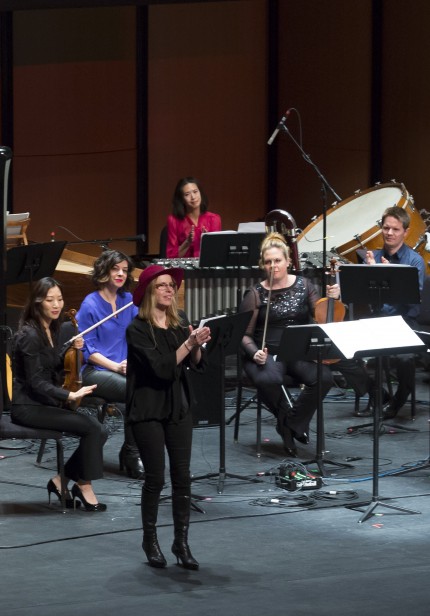Clyne and Bates works outshine interminable Boulez at MusicNOW

Monday’s MusicNOW concert at the Harris Theater offered one work each by the Chicago Symphony Orchestra’s two composers in residence along with a rarely heard epic by Pierre Boulez.
Anna Clyne’s Postponeless Creature received its world premiere Monday night. This MusicNOW commission is the third part in Clyne’s ongoing large-scale project As Sudden Shut, which will ultimately comprise a multimedia chamber opera on Emily Dickinson.
Few composers have the ability to create and sustain such varied and distinctive sound worlds as compellingly as Anna Clyne. Postponeless Creature is scored for three female voices (two sopranos, one mezzo) and a large chamber ensemble consisting of three flutes, string quartet and bass set against contrabassoon, timpani, vibraphone, harp and harpsichord.
The title refers to death, and Clyne’s setting of Dickinson’s stanzas skillfully exploits timbral extremes to unsettling effect. The women chant the Dickinson text in a high tessitura, while the harpsichord lends an ars antique quality, the music segueing into a danse macabre, creepy and unsettling in its waltz-like undulations. Yet the palette and music are subtly varied by Clyne over the 12-minute duration, slowing to a hushed, haunting coda for bass, harp and vibraphone.
Conductor Cliff Colnot led an atmospheric and well balanced performance with three members of the CSO Chorus (Kathleen O’Brien Dietz, Kathryn Kamp, and Elizabeth A. Grizzell) handling the challenging vocal writing with enviable ease.
There have been many Chicago tributes this season marking Pierre Boulez’s 90th birthday, which takes place Thursday. Few local events have been more musically ambitious than Monday’s performance of the French composer-conductor’s Dérive 2.
Dedicated to Elliott Carter, Dérive 2 was, like many Boulez works, several years in the making, in this case over two decades (1988-2009). Unlike most Boulez efforts, Dérive 2 is cast on a huge canvas of nearly 50 minutes. As Gerard McBurney explained in his video introduction, the title refers to deviations, as a plane might slightly alter its path over time, reflected in Boulez’s habit of slowly expanding on his compositions over many years. McBurney compared experiencing Dérive 2 to being “lost in a labyrinth.”
That’s likely a more accurate summary of the piece than McBurney intended. I’ve been ambivalent about Boulez’s music and in shorter works have appreciated his precision and varied palette of timbres and hues.
Yet while manageable in small does, Dérive 2 starkly demonstrates the inherent limitations of Boulez’s self-consciously cerebral muse.
Fine as Monday night’s performance was, hearing Boulez’s notational algorithms at this sprawling length makes manifest the icy chill and lack of warmth, variety and humanity at the center of his music. After fifteen minutes, I wanted to run from the theater like my hair was on fire. Dérive 2 is arid and soulless, a joyless intellectual exercise, relentlessly busy and utterly unmemorable, spun out to interminable duration. Listening to all 50 minutes without pause felt like the musical equivalent of water-boarding.
Colnot kept this unkempt leviathan on the tracks and the ten musicians deserve some sort of corporate badge of courage for performing it. I hope for their sake playing this music was more rewarding than listening to it.
Compared to the numbing Boulez, Mason Bates’ Indigo Workshop seemed like a work of unalloyed genius.
At just five minutes, at least the evening’s centerpiece for solo piano has the virtue of concision. A companion piece to his White Lies for Lomax—a homage to pioneering American musicologist Alan Lomax—-Bates’ Indigo Workshop is a spirited populist romp, working a Stravinskyian toccata into a jazz-tinged mashup with syncopated rhythms and a bit of Thelonious Monk thrown in for good measure. Winston Choi delivered a sassy performance of high-stepping panache.
Posted in Uncategorized


